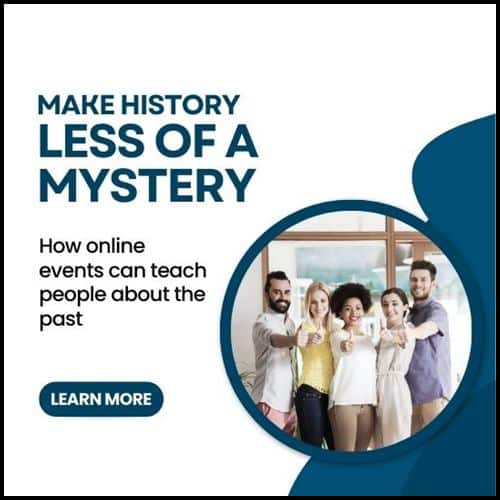
Whether you are looking to further your academic offerings or improve your lessons, this article will look at how online events can be leveraged to support history lessons.
Firstly, what are online events?
Due to global events and an increase in technological innovations, many events that would have typically been attended in person are now hosted online. These online events might also be referred to as ‘virtual’ events, as they exist in the virtual space.
From business to education, the applications are seemingly endless. One example of this is a webinar. But, ‘what is a webinar platform’? Put simply, think of a seminar, but on the web.
A webinar platform is a cloud-based software that allows people to host events online, as well as integrate various features like polls, quizzes, and live chat so that attendees can talk to the host – which are just a few reasons why webinars are used in educational settings.
So, how can these kinds of online events help educators teach people of all ages about historical events and themes? Let’s take a look.
Broaden the reach
If you were to set out to teach people about the past, chances are your audience would be limited to the geographic location in which you live or work. This is because attendees are less likely to want to travel to a course they could do elsewhere, nearer to their home.
However, by holding the events online, the sky’s the limit. Virtual events can be attended by anyone, anywhere, on any device across the globe, as long as they have internet connectivity.
Improve accessibility
Whether you have students who have a physical disability or learning difficulties, it goes without saying that mainstream academia doesn’t always best support people with additional needs.
Conversely, online events are significantly more accessible. If attendees miss a class, you can record that session and send it to them to catch up. In addition, if some attendees take a little longer to grasp more complex concepts, they can rewatch sessions at a slower pace to give them more time to process.
Offer interactive learning
There are several different learning styles, including visual, auditory, and kinaesthetic. By offering events online using a digital platform, you can incorporate images, sounds, videos, practical tasks, quizzes, surveys, discussions, and more.
In doing so, you’ll be able to better cater to each different learning style, which will ultimately allow you to improve the results of your historical events.
Increase engagement
Scientific and behavioural studies have found that interactive learning can improve recognition and recall. In other words, it makes the content more engaging, which improves participants’ ability to remember the topics covered.
In addition, interactivity can also increase attraction and attention for a specific product or service – it’s more persuasive and influential, and easier to understand. Thus, online events can boost engagement with your teaching platform as a whole, as well as engagement in the specific historical event at hand. As you can see, if you are looking to make history less of a mystery, you might want to consider utilising online events to help teach people about the past in a way that is more engaging, interactive, and accessible.
Leave a Reply
You must be logged in to post a comment.